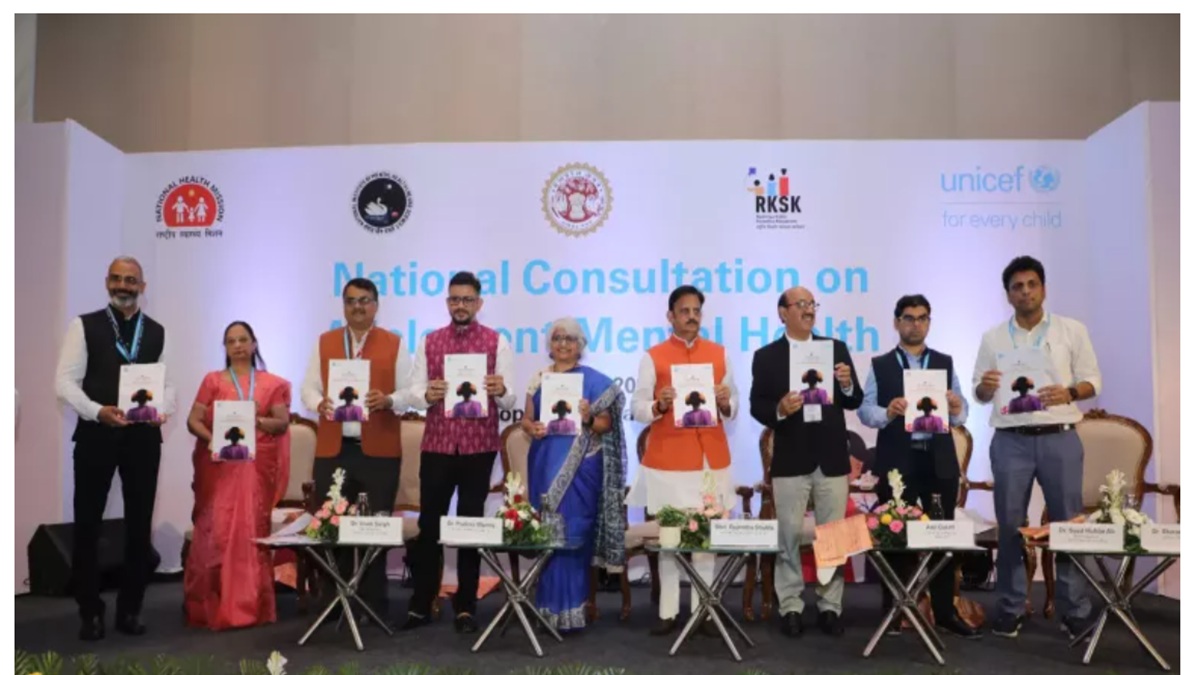Key Points
- Attended by senior officials from various departments
- Ministry of Health and Family Welfare in collaboration with UNICEF and NIMHANS
- Mental health education
The Ministry of Health and Family Welfare in collaboration with UNICEF and the National Institute of Mental Health and Neurosciences (NIMHANS) released a national fact sheet on Adolescent and Youth Mental Health and a supplement training module - I Support My Friends at a national consultation in Bhopal. This is in addition to the pre-exiting adolescent peer-support module under Rashtriya Kishor Swasthya Karyakram (RKSK) programme.
The programme is in response to the urgent need to equip adolescents with practical tools to identify signs of emotional distress, offer empathetic support and link peers to further help all while protecting their own boundaries and well-being. Mental health programmes take into account the well-being and mental health of service providers, especially front-line workers and peer educators, by including supportive supervision to ensure their well-being and quality of care. Supervision in mental health service training is not administrative but supportive of the whole person giving support to others.
Official Press Release - Click Here
The launch was attended by senior officials from the Department of Health and Family Welfare, Department of School Education, and Department of Women and Child Development, Government of Madhya Pradesh, along with Dr Saloni Sidana, MD NHM MP, and Dr Syed Hubbe Ali, Health Specialist and Anil Gulati, Chief of Field Office a.i, UNICEF Madhya Pradesh. Experts from institutions including AIIMS, TISS, NIMHANS, and the Centre for Mental Health Law & Policy participated in the event.
The session highlighted the needs for early support and reduced stigma around mental health conditions including anxiety, low self esteem, digital addiction, depression and self harm among adolescents. Drivers of mental distress are perception of mental health among young people, including adolescents, family stress, academic pressures, and relationship conflicts. Discussions were conducted on perception, family expectations, academic pressure and relationship conflicts which key stress points. Youth advocates from across the country also shared their experiences, reinforcing the importance of creating a safe, supportive space for young people. Suicide prevention must be taken seriously and the media has a very important role to play in this by reporting responsibly, highlighting stories of hope and recovery, promoting coping strategies and help-seeking behaviour. The World Health Organisation reports that appropriate media portrayal of suicide is one of the effective universal strategies to prevent suicide.
Mental health is a spectrum that ranges from well-being to severe mental illness. It is not a binary that means well or ill. We all occupy different parts of the continuum at various stages of life, and awareness of this helps choose the right strategies to cope well and live well. The one-day training is built around a Look, Listen, Link Framework using interactive activities, scenario-based learning and guided reflection to foster emotional literacy, supportive communication and responsible peer engagement.
Narendra Shivaji Patel, Minister of State for Health, Madhya Pradesh while speaking at the event highlighted the importance of listening to and supporting youngsters. Adolescents today face immense pressure like academics, families and social environments, the minister stated. He further added that systems that allow adolescents to speak, be heard and feel supported must be created.
Rajendra Shulka, Deputy CM, Madhya Pradesh stated that empowering adolescents with the tools required to care for their mental wellbeing and their peers is an investment in the future of the state and the nation. He further pointed out that through the initiatives like RKSK and the new-peer-support addendum a society is built where young people are heard, supported and equipped to thrive.
Deputy Commissioner for Adolescent Health, MoHFW Dr Zoya Ali Rizvi mentioned that the launch of the module is part of a wider national vision for mental health policy and practice. India is moving towards a more integrated youth-responsive mental health system and the goal is to create national guidelines empowering early prevention, strengthening local systems supporting adolescents through evidence-based tools such as peer-support modules, she further added.
Director, NIMHANS, Dr Pratima Murty highlighted the need to begin mental health support early and embed the same into schools and community spaces. Drivers of mental health are always social and external to the person, and hence mental health considerations should be embedded in multiple sectors, including education, social protection, livelihoods, disaster management, and protection services. Bringing together technical experts, youth, policymakers, decision-makers and media will play a vital role in addressing the requirements and advancing the country's vision of a Vikasit Bharat.
UNICEF - India Chief of Health Dr Vivek Singh highlighted the remarkable progress the country has made on mental health in recent times. He stated that the integrated mental health framework needs to be focused on and UNICEF is committed to support the government in this. Proactive, non-health, prevention and promotion of mental health programmes to respond to the distress faced by children in schools and communities is extremely important. This helps prevent escalation of distress and avoids overwhelming the limited specialised mental health resources.
Chief of Field Office - UNICEF Madhya Pradesh, Anil Gulati when speaking at the event added that the state and community systems are the key to translate national mental health priorities into real change for adolescents. Especially vulnerable children like those without parental care, migrants, children with disabilities, and those in conflict with the law need more sensitive and trauma-informed care to give them a fair chance at achieving social and economic mobility.
Mental health programmes must be designed with the adolescents or user groups who are intended to be the target audience to ensure the acceptability and usefulness of such services.
Also Read: Ministry of Skill Development Launches SOAR Programme to Teach AI in Classes 6-12

Comments
All Comments (0)
Join the conversation